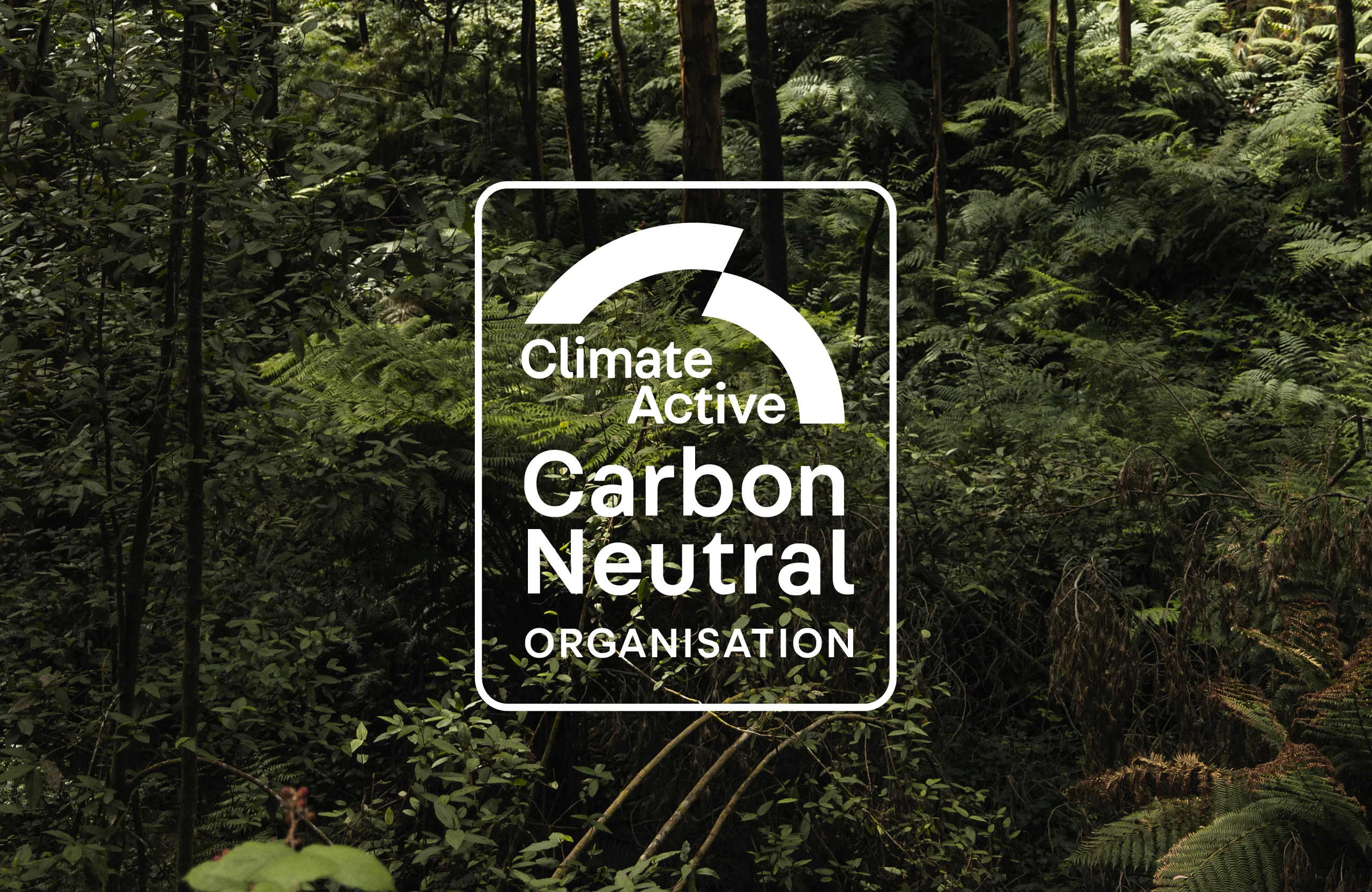
We're proud to share that we've now been Climate Active carbon neutral certified for three years! Part of the process is measuring and recording our carbon footprint, and from this, we have retrospectively offset our emissions from 1 July 2019.
Becoming carbon neutral is part of our commitment to B Corp's Net Zero by 2030 initiative, but it’s also a commitment to our values as a business. We are here to do good today.
Damon O’Sullivan, Co-founder and CEO says, “Our business name is a marker of our time, of now, of the context in which we are living. It’s essential that our business, and every business, considers the impact on people and the planet in every decision we make. It's not just about reducing harm, it's about looking for ways to create more social and environmental value.”
Our social and environmental policy is our commitment to our duty of care to the environment and community. It details how we are constantly working to improve.
Now we’re asking other businesses to join us and take the steps to become carbon neutral. Our collective future depends on it.
The carbon offset projects we're supporting
To offset our emissions in 2021-22 we purchased 125 Climate Active credits and 125 Greenfleet offsets. The reason for purchasing two sets of credits, is that we wanted to support a project in Australia, as well as one that was recognised globally by Climate Active.
For our internationally Climate Active recognised credits we invested in the Mytrah Energy Wind Power Project
Mytrah Energy operates a multi-site wind power project in India in Madhya Pradesh, Andhra Pradesh, Rajasthan and Telangana States.
The project has 156 wind generators with a total installed capacity of 233 MW. It is a Verra Standard source of VCS carbon credits on the carbon market.
The energy generated from this project supplies the region and feeds into the Southern Grid. The project’s clean electricity displaces an equivalent amount of energy generated from fossil fuel-based thermal power stations – polluting fuels from coal, diesel, furnace oil and gas. This project reduces greenhouse gas emissions by approximately 479,448 CO2e per annum.
As well as providing a source of clean energy, the Mytrah Energy Wind Power Project improves the overall well being of local communities. The result of Mytrah’s work is impressive, it provides employment, clean water and sanitation, improved agricultural techniques, and opportunities for everyone - including women and youth. Here are just a few examples.
Providing training for youth: New training programs help youth find meaningful employment. Areas of study include IT, electrician courses, motor repairs and dairy management.
Creating educational programs for gender equality: Opportunities for adolescent girls include coaching and life skill training. Mytrah facilitates Adolescent Girls Collectives with an aim to restore the rights of young women through parent and community-wide participation.
Building better healthcare systems: This initiative provides training for healthcare workers. One successful program teaches early diagnosis for common diseases such as hypertension and diabetes. Today there is a clinic and laboratory staffed with skilled volunteers.
Clean water and sanitation: The Swachh Bharat Sanitation Project improves the health and quality of life for rural-based people in the region. The initiative educates communities in sanitation and cleanliness, and provides the necessary infrastructure.
For our Australia-based investment we wanted our choice of carbon offsets to pay respect to the thousands of years of intimate knowledge that First Nations Peoples have on their land.
So we chose to also invest in Greenfleet’s Yurol Ringtail Project on Kabi Kabi Country in Queensland.
Greenfleet understands the responsibility they have to Traditional Owners, working proactively alongside them to restore native biodiversity, protect and heal country. Spanning two sites located on Kabi Kabi Country in Queensland, Yurol and Ringtail make up around 1,100 hectares of cleared land that Greenfleet is restoring to legally protected native forest as they transition to National Park in the Noosa Hinterland.
This project is:
- Protecting our climate by restoring legally protected native forest
- Creating vital koala habitat
- Delivering verified social and cultural benefits for Traditional Owners
- Replacing monoculture plantation with biodiverse native ecosystem
The revegetation area is Greenfleet’s biggest project and an incredible 1,000 times the size of Queensland Suncorp Stadium’s playing surface.
"This is something that we’re going to be able to look back on, to see 2,400 hectares of land come across to national park, revegetated to capture some carbon, create wildlife connectivity, koala habitat, water quality advancements, Indigenous work, Kabi story lines. I think in my lifetime, this will be the single biggest environmental improvement that I see. It’s an exciting project.” - Phillip Moran, General Manager at Noosa District Landcare
In 2021, Greenfleet signed an Indigenous Land Use Agreement (ILUA) with the Kabi Kabi Peoples Aboriginal Corporation, which represented a vital step in this project.
Together with Kabi Kabi people, the Traditional Owners of Queensland’s Sunshine Coast region, Greenfleet has developed a new carbon offset with cultural and social co-benefits that are verified by the Aboriginal Carbon Foundation.
